- Home
- Chuck Palahniuk
Rant: An Oral Biography of Buster Casey Page 23
Rant: An Oral Biography of Buster Casey Read online
Page 23
Neddy Nelson: Isn’t rabies what wrecks your port so you can’t boost peaks? After that, aren’t you free to flashback?
Irene Casey: I remember trying to hold my breath, because, every time I breathed out, he settled on top of me, heavier, making my next breath smaller. Crushing my insides, smaller, until stars of light spun around in my eyes. In the blue silk sky.
He said, “I’ve been watching your trash.”
I remember the long sleeves of the sweater, wrapped and twisted around me, tight as those coats that crazy people wear in movies so they can’t move their arms. My, each of my fingers, tied a different way.
From watching the trash, he said, “I know the hours and minutes since your last period.” And he said how the baby I’d have, right now, would almost for sure be a boy. He would be a king, that boy. An emperor. A genius who would make me rich and exalted above all other women.
And with my every breath out, he settled heavier on top of me, making my next breath more shallow, until I was only half awake.
Neddy Nelson: Isn’t that why the government pushed to port everybody? Because weren’t too many people Party Crashing to mess with history?
Irene Casey: The air smelled like clean water in a clear glass on a hot day. The ice smelled like nothing. The dirt, froze stiff. The river, froze solid. No wind. Like we was outside of time. Nothing happening except us.
He said how boy sperms swim faster, but don’t live as long as the girl sperms, and his breath smelled like a burp after you’ve ate pork sausage for breakfast.
I said I had to pee.
And he said, “When we’re done.”
Neddy Nelson: Don’t you know about the covert government effect? People aren’t even aware it’s boosting, but doesn’t the effect keep you stuck here so you can’t mess with history?
Irene Casey: I remember I told him how sorry I was for peeing on him. Peeing on both of us. But it hurt so bad, and the cold air made the hurt worse. Those days, walking out, I’d layer maybe nine, maybe ten pair of panties. To give me hips till I’d fill out.
I didn’t want to, but when he worked my zipper down and slipped his cold thumb inside all those panties, inside me, I peed. All hot, creeping through my jeans and underwear. The hot wicking up the yarn of my sweater. The rest of me, ice cold.
In the dirt, in my Christmas sweater, with this man crushing the air out of me, calling me “the mother of the future,” I couldn’t picture how this’d get any worse.
I remember him turning his hand in front of my face, his fingers wet and steaming in the cold, and me saying, “I’m sorry.”
I said, “We’re safe.”
His wet fingers inside me, I kept calling him “mister.” Kept saying, “Those dogs are long gone.”
Neddy Nelson: Don’t Historians call it “Oblivion,” the place without place, where time’s stopped. The place outside of time.
Irene Casey: This man brung one knee up to my chest, like to kneel on me, and he brung it down, hooking the toe of his black shoe in the crotch of my jeans. As he stomped the jeans and panties down around my socks and ankles, in that instant, I remembered how many folks were sat down to Christmas dinner at my house. Too many for my mother to ever miss me.
Echo Lawrence: The Easter egg that Rant left for me, he’d written on it with white wax, so that when I soaked it in dye I could read his hidden message.
Irene Casey: Worse than Basin Carlyle fouling you, nailing you too hard, down there with a dodgeball in phys ed. Worse than the cramps. That punching, pushing, shoving inside, it hurts. Gritty and grinding with dirty water, the ice, melted under me. That thin part of ice, turned to mud puddled under me.
I pictured fabric, stuck in one place, stabbed again and again in a big, slow sewing machine.
My arms wrapped tight as a baby or a mummy, just-born or dead-helpless, the man moved on top of me, faster, until he stopped, and every muscle and joint of him turned hard as stone, froze.
Then all of him went loose, relaxed, but he didn’t let go. His fingers kept a hold of me.
His heart slowed, and he said, “It didn’t happen, not yet. To be safe,” the man said, “we’ll need to go again.”
Echo Lawrence: Instead of dye, I dropped the egg in a cup of coffee. After I drank the coffee, the egg sat there in the bottom of the paper cup, Rant’s words telling me: “In three days, I’ll return from the dead.” Some kind of Easter quote.
Irene Casey: While the man waited, he sniffed his hand and said, “You smell just like your mama and grandma and great-grandma smelled at your age…”
Nothing moved. Nothing barked.
“Have this baby,” he whispered, his mouth on top of my eyes, his lips on my shut-tight eyelids, “and you’ll be the most famous mother in all of history…”
Down there, he was moving again, pressing me into the ice, through the ice into the river, and he said, “You don’t have this baby and I’ll come back to make you have another…”
From the Field Notes of Green Taylor Simms: If you must know, the hidden message written on my egg was “Fuck You.”
Irene Casey: “Yes,” he said, his chin grinding whiskers against the side of my neck. He said, “Yes. Yeah. Oh yeah.” He said, “Please.”
His hips bucked against me so hard, one crack, two, three lightning-bolted through the ice underneath. Water lapped up from under. White cracks, zigzagging toward shore.
Shot Dunyun: I didn’t know why, but my egg said, “Green Taylor Simms.”
Irene Casey: When he lifted up on his elbows, the man looked down and said, “You’re bleeding.”
He looked at my hand, how inside my fist, from holding the coin so tight, I made the gold cut open my palm skin. The edges carved a perfect round scar, deeper at the top and bottom of the circle. The man pried my fingers back, and inside them, the gold coin looked like Christmas in my bright-red blood. Weeks into the new year, I’d have a purple bruise dated 1884.
And the man told me, “Keep it. To pay for cleaning your sweater.”
From the Field Notes of Green Taylor Simms: Until now, Party Crashing hadn’t a face, and it seems imprudent to give it one. There is no such phenomenon as “flashbacks.” No immortal “Historians” exist. Which is more likely—all this time-travel rubbish, or the fact that one young man went insane?
To profess otherwise would be extremely reckless and irresponsible.
Irene Casey: The man pulled up his pants, his thing still steaming with pee and blood. Still dripping sperms. He pulled up the zipper and looked his head around. Looking down at me, he said, “Stay until I’m gone.”
And he walked upriver on the water, all the way to over the most far-off horizon.
Tina Something: No, the real lie, the real liars, are Echo Lawrence and Shot Dunyun, because they know the truth but won’t tell. You can flashback in time and tinker with events. And every night, they still try.
Irene Casey: My legs, open to the blue Christmas sky. My sweater was froze, stitched into the ice a bunch of places. Half sleepy from not breathing, my eyes watched the water bubble up through the cracks around me. My ears heard the whine and moan of the river pulling apart the broke pieces.
The living, alive blood and piss of me, freezing. The man’s sperms.
The river ice shifting, breaking up. Coming to life.
Tina Something: That’s how most of the people in power have anticipated and profited from current events. It could be, this is how people have always taken control. Or this dropping back might be limited to modern history. I don’t know. You can’t know. All I know is: People do this. And they don’t want you to.
Irene Casey: Me, just letting the ice sink me lower into the deep cold, my ears hear a voice come out of the bushes. In the cattails along the edge of the froze river, a voice said, “Mrs. Casey?” Said, “Irene?”
The voice said, “Mom?”
And a mostly naked boy stepped out, shaking and wrapped in his own arms.
A blue sheet of paper hid the front bit
of him. A hospital getup. He stood in paper slippers, saying, “I couldn’t catch a ride.”
His teeth rattling together, the boy said, “I’m too late.” He said, “Am I too late?”
Echo Lawrence: The hospital ID bracelet that Chester wore that day, it’s dated from the day they pulled him out of the river. Nineteen years to the day before Rant plowed his car into the same stretch of water. I still have that bracelet. Chet gave it to me.
The day Rant disappeared into the river, and the day Chet washed up, both days December 21.
Irene Casey: The boy stood pigeon-toed on the froze mud, both his hands knotted in the steam coming out of his mouth. His whole body clenched and shaking, like a skinny fist, he said, “It’s going to be okay…You’re going to be okay…”
Scars running up and down his arms. His chattering teeth black.
Maybe only old as a high-schooler.
Except for some blue paper, standing in those cattail reeds naked as a baby.
Neddy Nelson: Icky as it sounds, didn’t Rant marry his mom? Didn’t he change his name to Chester Casey and stick around to raise the kid? To help raise himself?
Irene Casey: I couldn’t sit up, so much of me froze into the ice. I couldn’t reach down enough to find my jeans or some panties.
The sheets of ice shifting and tilting, the naked boy come stumbling out toward me. He kept saying, “Don’t move.” Kept saying, “You’re hurt.”
The river gushing up, flooding the ice, he said, “Don’t ever try and hitchhike dressed thisaways.”
His blue paper slippers slipping and shuffling to come stand next to me, he gets low to help with my panties, my jeans. As his shaking fingers leaned in, close, to reach me, a spark jumps between us. Between his touch and mine, a static spark, it snaps. Loud. Electric-bright in the daylight. Between his fingertip and mine.
Neddy Nelson: Isn’t it like—the Trinity? Rant and Chester and old Green Taylor Simms, like in Catholic Church, three people being the same but divided?
Irene Casey: Froze together, crawling off the busted ice, my ears hear the river lap behind us. My Christmas sweater stretched and dirty. Stained red and yellow. Blood and pee. Baggy and ruined.
The naked boy said, “I’m sorry about…this.”
And I undid the buttons and peeled my arms out of the muddy sleeves. I held the sweater out, saying, “Take it. You’ll catch your death.”
Neddy Nelson: Doesn’t that explain why Chet Casey wasn’t more broken up about his kid being dead? Why Chet just moved in and set up house? Aren’t we talking about big backward loops in time?
Irene Casey: Walking back to Christmas dinner, I asked him, “Who exactly are you?”
And this boy says, “You don’t want to know…”
Echo Lawrence: Loops, like embroidery stitches.
Shot Dunyun: How impossible is that? Rant Casey isn’t dead, he’s become Chester. The dad. When Rant’s car caught fire and Christmas-treed off the side of the Barlow Avenue Viaduct, he flashbacked in time, but not to kill Irene, as Simms had planned. Rant only went back to stop the attack on Irene. It’s beyond impossible.
Irene Casey: And that’s how Chet come into my life. I didn’t know it for sure, not until my next period never come, but that’s how Buddy come to life, too.
Echo Lawrence: The dogs barking woke me up. Still parked, watching Rant’s old house. Still night. The front porch light blinked on, and the screen door creaked. The outline of someone leaned out, and a woman’s voice shouted, “Fetch!”
The howling, barking, and snarling shrank, smaller, the sound blurred.
Shot Dunyun: The woman on the porch, in the glare of the yellow lightbulb, yelled, “Fetch! Come on, boy!”
From next to the trunk of a locust tree, a shape broke away. A figure stepped out, and a man’s voice said, “Mrs. Casey?”
Echo Lawrence: And Irene said, “Bodie? Bodie Carlyle?”
By then, the figure had one foot on the bottom porch step. The screen door squeaked, and Irene said, “Get in here. You’re going to catch your death…”
Bodie Carlyle ( Childhood Friend): You see, life only turns out good or bad for only a little bit. And then it turns out some other way.
Shot Dunyun: The man stepped inside. The porch light went out.
Neddy Nelson: And isn’t this the point when that bogus Sheriff Carlyle arrested us?
38–Communitas
Dr. Christopher Bing, Ph.D. ( Anthropologist): The phenomenon commonly known as Party Crashing is simply the latest manifestation of a liminal space which provides a cathartic sublimation, generating a normative communitas, thereby deflecting any pent-up hostility toward the status quo and preserving the existent social structure.
From the essay “Liminality and Communitas” by Victor Turner ( Anthropologist): Prophets and artists tend to be liminal and marginal people, “edgemen” who strive with a passionate sincerity to rid themselves of the clichés associated with status incumbency and role-playing and to enter into vital relations with other men in fact and imagination.
Dr. Christopher Bing, Ph.D.: As defined by the anthropologist Victor Turner in his book The Ritual of Process: Structure and Anti-Structure (1969), liminal spaces occur at the interstices between two distinct phases of life. According to Turner, absurdity and paradox define regularity. The regularly occurring chaos of liminoid space is what allows for an otherwise organized civilization.
Ina Gebert, M.A. ( Theologist): Arguably, the best example of a liminal space is the secular ritual of Halloween as currently practiced in the United States. On that particular evening, the power hierarchy is inverted, permitting children to demand tribute of adults. Said children don masks to mimic symbols of power. These include ghosts and skeletons, agents of the dead; witches, who ruin fertility; savage animals such as wolves and lions; or cultural outsiders such as cowboys, hobos, and pirates. Masquerading thusly, the children threaten to inflict property damage as punishment for adults who fail to reward them.
Dr. Erin Shea, Ph.D. ( Theologist): Established examples of large liminoid spaces include the annual Burning Man festival in the Black Rock Desert of Nevada, the ConFest held in Australia, the international Rainbow Family gatherings, and the so-called “Celtic Renaissance” held in Glastonbury, England.
Dr. Christopher Bing, Ph.D.: Generally speaking, liminal versus liminoid is defined as follows. The term “liminal” refers to a ritual that marks passage from one phase of life to the next: a baptism, a graduation, a honeymoon. In contrast, a typical “liminoid” event such as a rock concert, a rave, or a polyamorous consensual group sex party occurs outside of the mainstream, but a liminoid event marks no such life transition. The defining characteristic of the liminoid space is that all participants act as equals. Social or caste rankings are discarded, and all present enjoy an egalitarian mutual affection for one another. Turner’s name for this spontaneous solidarity and love was the Latin word communitas.
Dr. Erin Shea, Ph.D.: Smaller examples of liminoid spaces include religious pilgrimages, “road trip” vacations, fight clubs, and Party Crashing events.
Ina Gebert, M.A.: Among liminal spaces the most common are rituals in which members of a society temporarily exchange their respective status. The king becomes a servant. The servant, a king. The Roman Catholic Pope kneels to wash the feet of the poor. The well-dressed, respectable Pentecostal celebrant collapses to the floor, twitching and muttering gibberish. Aboard nuclear submarines submerged for three-month tours of duty, the officers and crewmen exchange roles in periodic rituals such as “Hefe Café,” a formal midmission dinner during which the commanders must serve and obey their inferiors. In each instance, this short-lived degradation enhances the long-term power of the ruling entity.
Dr. Christopher Bing, Ph.D.: At its worst, the liminal or liminoid event functions as a release for accumulated anxiety, thereby protecting the overall civilization. At its best, liminal and liminoid spaces become social laboratories wherein participants can experiment and develop
new forms of self-expression and social structure.
Ina Gebert, M.A.: The living always feel superior to the dead. Consider that death is the ultimate degradation—as well as the opportunity for a community to safely voice its true feelings about an individual. Witness the funeral scene from Tom Sawyer, in which the community believes the title character to be drowned, and they hold a funeral to publicly mourn. Despite their customary disdain for the “deceased,” the community expresses its repressed love. Once Tom Sawyer appears, seemingly returning from the dead, the community rejoices.
Dr. Erin Shea, Ph.D.: It’s arguable that local authorities are aware of Party Crashing and permit it to continue. The ritual would provide a cathartic release for antisocial and antiauthoritarian impulses, either exhausting those persons, crippling them, or removing them entirely via death. Regardless of the outcome, Party Crashing would serve as a cost-effective, efficient social program for preserving the current social order.
Dr. Christopher Bing, Ph.D.: A typical liminal ritual occurs in three stages. The pre-liminal. The liminal. And the post-liminal. Applied to the Party Crashing phenomenon, these stages manifest as: decorating and parading the vehicles; the actual hunting and accidents; and the post-accident public performance of arguing and acting out, commonly known as “milking the accident.”

 Fight Club
Fight Club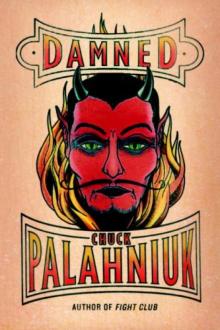 Damned
Damned Tell-All
Tell-All Choke
Choke Make Something Up: Stories You Can't Unread
Make Something Up: Stories You Can't Unread Invisible Monsters
Invisible Monsters Phoenix
Phoenix Beautiful You: A Novel
Beautiful You: A Novel Haunted
Haunted Survivor
Survivor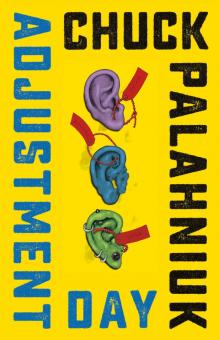 Adjustment Day
Adjustment Day Pygmy
Pygmy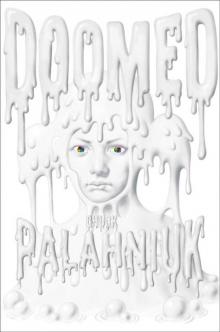 Doomed
Doomed Lullaby
Lullaby Snuff
Snuff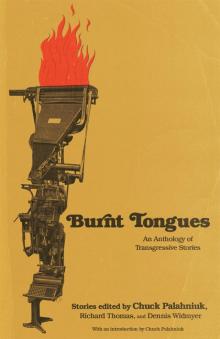 Burnt Tongues
Burnt Tongues The Invention of Sound
The Invention of Sound Stranger Than Fiction (True Stories)
Stranger Than Fiction (True Stories) Rant: The Oral History of Buster Casey
Rant: The Oral History of Buster Casey Make Something Up
Make Something Up Rant: An Oral Biography of Buster Casey
Rant: An Oral Biography of Buster Casey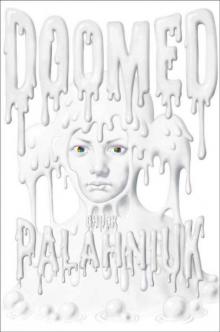 Doomed d-2
Doomed d-2 HOPE AND GORY
HOPE AND GORY Invisible Monsters Remix
Invisible Monsters Remix Beautiful You
Beautiful You Fugatives & Refugees
Fugatives & Refugees